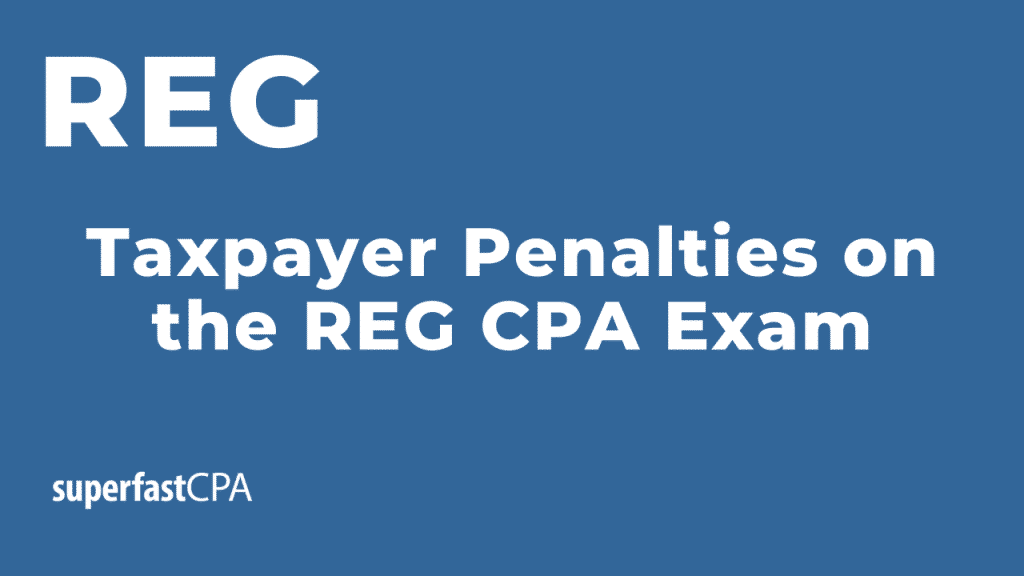There are multiple types of taxpayer penalties on the REG CPA exam you should know. The IRS charges penalties to taxpayers who don’t file or pay their taxes on time, there’s also accuracy penalties (paying the right amount of tax). The common taxpayer penalties charged by the IRS that you could see on the REG CPA exam include:
- Failure to file penalties
- Failure to pay penalties
- Failure to pay estimated tax
- Accuracy related penalties
Table of Contents
Failure to file IRS penalties
The penalty for filing late is 5% a month of the tax due, up to 25% of the tax due. There is a minimum penalty if the return is filed more than 60 days late of the lesser of $435 or 100% of the unpaid tax. If the taxpayer does not owe any taxes or is due a refund, no penalties will apply.
If the failure to file is deemed fraudulent, then the penalty increases to 15%, up to a maximum of 75% of the unpaid taxes.
Failure to pay or late-payment penalties
Taxes are due by the filing date. If they are not paid by the filing date, interest on late payments starts to accrue immediately.
The late payment penalty is 0.5% (1/2 a percent) per month, up to a max of 25% of the taxes owed. However, if the non-filing penalty is also applicable, then that 5% per month accrues and the 0.5% penalty is not applicable.
Estimated tax payments
For individuals, taxes are paid through withholding, or through estimated tax payments.
If the amount of tax owed total will be more than $1,000, then the taxpayer must make estimated tax payments on the 15th of April, June, September, and January. (Again, this is if taxes aren’t being paid through withholding)
No penalty will be imposed if the tax payments during the year were at least 90% of the current year’s taxes or 100% of last year’s taxes. If the taxpayer’s AGI exceeds $150,000, then the tax payments during the year must be 110% of last year’s taxes.
Accuracy penalties
A 20% of the tax due penalty for an inaccurate tax position due to negligence. This is waived if there is a reasonable basis for the position.
A 20% of the tax due penalty for substantially understating the tax due. This is waived if there is substantial authority for taking the position, OR if the position was appropriately disclosed on the return.
What is a “substantial understatement”?
An understatement is substantial if it is more than the larger of 1) 10% of the correct tax amount, or 2) $5,000 for individuals. For corporations it is if the understatement is the lesser of 1) 10% of the correct tax (or a flat $10,000 if 10% is larger) or 2) $10 million.
A 20% of the tax due penalty if there is a substantial overstatement or 40% for a gross overstatement of the value or basis of any property. Substantial is 150% or more of the actual value, gross is 400% or more of the actual value.
If fraud is involved in the underpayment, then there is a 75% of the tax due penalty.
Other taxpayer penalty issues
The following are some random facts that you might see questions on related to taxpayer penalties.
Form 1040x for claiming previous year refund
If a taxpayer wants to make a claim for a refund on paying too much tax in a previous year, the form they would use is the 1040X, the “Amended US Individual Income Tax Return”
Filing an amended return timeline
To file an amended return, the taxpayer has 3 years after the filing date of the original return, or 2 years after the payment of tax related to the return, whichever is later.
Filing a “frivolous” tax return
If the taxpayer files a “frivolous” tax return, there can be a penalty of $5,000. If a taxpayer and their spouse file a “frivolous” joint return, they will be fined $5,000 each. A frivolous return is a return that doesn’t include enough information to calculate the correct amount of tax, or the information clearly shows that the tax reported is substantially incorrect.













